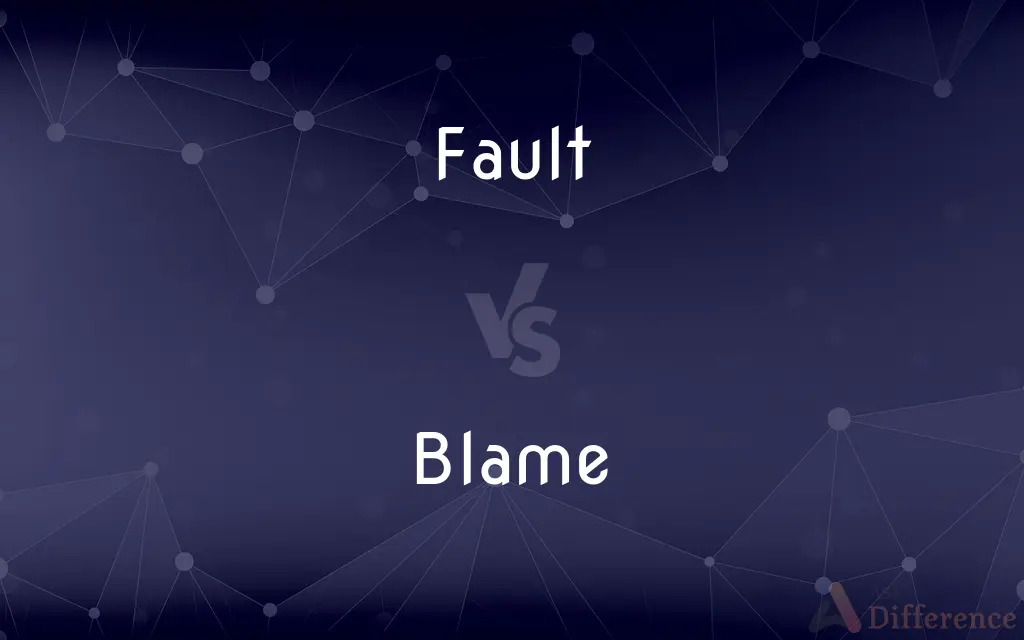Fault vs. Blame — What's the Difference?
Edited by Tayyaba Rehman — By Urooj Arif — Updated on April 6, 2024
Fault refers to responsibility for a mistake or wrongdoing, often rooted in actions or negligence, while blame involves assigning this responsibility to someone, usually accompanied by criticism or judgment.

Difference Between Fault and Blame
Table of Contents
ADVERTISEMENT
Key Differences
Fault inherently deals with the cause of a problem or error, emphasizing the origin or reason behind a mistake or wrongful act. It's an acknowledgment that a specific action, decision, or lack thereof directly led to an undesired outcome. On the other hand, blame is the act of attributing fault to someone, often accompanied by negative judgment or criticism. It goes beyond mere acknowledgment, involving an emotional or moral judgment about the person or entity at fault.
While fault can exist independently of blame—acknowledging that a mistake has been made without attributing it to someone—blame always requires a target. Blame involves an active decision to point out and often criticize the party at fault, which can influence relationships and social dynamics. In contrast, recognizing fault can be a more neutral, analytical process aimed at understanding causes and preventing future errors.
The concept of fault is crucial in areas like law and engineering, where understanding the cause of a problem is essential for resolving issues and preventing recurrence. Conversely, blame is more relevant in social and interpersonal contexts, where the focus is on accountability and moral responsibility. Assigning blame can have significant psychological and social consequences, affecting individuals' reputations, self-esteem, and relationships.
Fault may be distributed among several parties, indicating that a problem or error was the result of complex factors or collective failure. In such cases, understanding the distribution of fault can help in creating fair and effective solutions. However, blame is often singularly directed, simplifying complex situations into a narrative of individual culpability. This can sometimes obscure the full context and prevent a comprehensive understanding of an issue.
The distinction between fault and blame highlights the difference between understanding the origins of a problem and the human tendency to assign moral or social judgment. Recognizing this difference is crucial for effective problem-solving and maintaining healthy interpersonal relationships, as it allows for a focus on resolution and improvement rather than punishment or ostracism.
ADVERTISEMENT
Comparison Chart
Definition
Responsibility for a mistake or wrongdoing due to one's actions or inactions.
Act of assigning responsibility and often judgment for a wrongdoing.
Focus
Identifying the cause or origin of an error or problem.
Attributing fault to someone, often with criticism.
Context
Can be used in technical, legal, and interpersonal contexts.
Primarily used in social and interpersonal contexts.
Emotional Component
Generally neutral, focused on understanding and prevention.
Often involves negative emotions or judgments towards the person at fault.
Outcome
Aimed at identifying issues for correction or improvement.
Focuses on accountability, sometimes leading to social or personal consequences.
Compare with Definitions
Fault
An error in a computer program or system.
Debugging involves finding and fixing faults in the code.
Blame
Assigning fault in a social or relational context.
Blaming others can hinder personal growth and relationships.
Fault
A defect or imperfection in a mechanical system.
The engine failure was traced to a fault in the cooling system.
Blame
The act of accusing someone of wrongdoing.
The media quickly blamed the politician for the scandal.
Fault
A personal shortcoming or failure.
His inability to apologize was seen as a major fault.
Blame
A way to express discontent with a situation.
He took the blame for the project's failure to avoid conflict.
Fault
The cause of an earthquake or geological disturbance.
The San Andreas Fault is a major source of seismic activity.
Blame
Criticizing for a perceived fault or error.
Parents often get blamed for their children's misbehavior.
Fault
Legal responsibility for an accident or mishap.
The court found the driver at fault for the collision.
Blame
Assigning responsibility for a fault or mistake.
The team blamed the loss on poor strategy.
Fault
A character weakness, especially a minor one.
Blame
Blame is the act of censuring, holding responsible, making negative statements about an individual or group that their action or actions are socially or morally irresponsible, the opposite of praise. When someone is morally responsible for doing something wrong, their action is blameworthy.
Fault
Something that impairs or detracts from physical perfection; a defect.
Blame
To consider responsible for a misdeed, failure, or undesirable outcome
Blamed the coach for the loss.
Blamed alcohol for his bad behavior.
Fault
A mistake; an error
A grammatical fault.
A fault in his reasoning.
Blame
To find fault with; criticize
I can't blame you for wanting your fair share.
Fault
A minor offense or misdeed
Committed her share of youthful faults.
Blame
To place responsibility for (something)
Blamed the crisis on poor planning.
Fault
Responsibility for a mistake or an offense; culpability.
Blame
The state of being responsible for a fault or error; culpability.
Fault
(Geology) A fracture in the continuity of a rock formation caused by a shifting or dislodging of the earth's crust, in which adjacent surfaces are displaced relative to one another and parallel to the plane of fracture. Also called shift.
Blame
Censure; condemnation
"Hoover hazarded more in the way of federal response to economic crisis than any president before him, but his efforts were not enough to divert the blame and wrath of the American people" (Michael B. Stoff).
Fault
(Electronics) A defect in a circuit or wiring caused by imperfect connections, poor insulation, grounding, or shorting.
Blame
Censure.
Blame came from all directions.
Fault
(Sports) A service of the ball that violates the rules in tennis and similar games.
Blame
Culpability for something negative or undesirable.
The blame for starting the fire lies with the arsonist.
Fault
(Archaic) A lack or deficiency.
Blame
Responsibility for something meriting censure.
They accepted the blame, but it was an accident.
Fault
To find error or defect in; criticize or blame
Faulted the author for poor research.
Faulted the book for inaccuracies.
Blame
(computing) A source control feature that can show which user was responsible for a particular portion of the source code.
Fault
(Geology) To produce a fault in; fracture.
Blame
To censure (someone or something); to criticize.
Fault
To commit a mistake or an error.
Blame
(obsolete) To bring into disrepute.
Fault
(Geology) To shift so as to produce a fault.
Blame
To assert or consider that someone is the cause of something negative; to place blame, to attribute responsibility (for something negative or for doing something negative).
The student driver was blamed for the accident.
Fault
(Sports) To commit a fault, as in tennis.
Blame
To assert the cause of some bad event.
We blamed the accident on the student driver.
Fault
A defect; something that detracts from perfection.
Blame
To censure; to express disapprobation of; to find fault with; to reproach.
We have none to blame but ourselves.
Fault
A mistake or error.
No! This is my fault, not yours.
Blame
To bring reproach upon; to blemish.
She . . . blamed her noble blood.
You were to blame, I must be plain with you.
Fault
A weakness of character; a failing.
Despite for all her faults, she’s a good person at heart.
Blame
An expression of disapprobation fir something deemed to be wrong; imputation of fault; censure.
Let me bear the blame forever.
Fault
A characteristic, positive or negative or both, which subjects a person or thing to increased risk of danger.
You're still young, that's your fault.
Blame
That which is deserving of censure or disapprobation; culpability; fault; crime; sin.
Holy and without blame before him in love.
Fault
A minor offense.
Blame
Hurt; injury.
Fault
Blame; the responsibility for a mistake.
The fault lies with you.
Blame
An accusation that you are responsible for some lapse or misdeed;
His incrimination was based on my testimony
The police laid the blame on on the driver
Fault
(seismology) A fracture in a rock formation causing a discontinuity.
Blame
A reproach for some lapse or misdeed;
He took the blame for it
It was a bum rap
Fault
(mining) In coal seams, coal rendered worthless by impurities in the seam.
Slate fault
Dirt fault
Blame
Put or pin the blame on
Fault
(tennis) An illegal serve.
Blame
Harass with constant criticism;
Don't always pick on your little brother
Fault
(electrical) An abnormal connection in a circuit.
Blame
Attribute responsibility to;
We blamed the accident on her
The tragedy was charged to her inexperience
Fault
(obsolete) want; lack
Blame
Expletives used informally as intensifiers;
He's a blasted idiot
It's a blamed shame
A blame cold winter
Not a blessed dime
I'll be damned (or blessed or darned or goddamned) if I'll do any such thing
He's a damn (or goddam or goddamned) fool
A deuced idiot
Tired or his everlasting whimpering
An infernal nuisance
Fault
(hunting) A lost scent; act of losing the scent.
Fault
(transitive) To criticize, blame or find fault with something or someone.
Fault
To fracture.
Fault
(intransitive) To commit a mistake or error.
Fault
To undergo a page fault.
Fault
Defect; want; lack; default.
One, it pleases me, for fault of a better, to call my friend.
Fault
Anything that fails, that is wanting, or that impairs excellence; a failing; a defect; a blemish.
As patches set upon a little breachDiscredit more in hiding of the fault.
Fault
A moral failing; a defect or dereliction from duty; a deviation from propriety; an offense less serious than a crime.
Fault
A dislocation of the strata of the vein.
Fault
A lost scent; act of losing the scent.
Ceasing their clamorous cry till they have singled,With much ado, the cold fault cleary out.
Fault
Failure to serve the ball into the proper court.
Fault
A defective point in an electric circuit due to a crossing of the parts of the conductor, or to contact with another conductor or the earth, or to a break in the circuit.
Fault
A dislocation caused by a slipping of rock masses along a plane of facture; also, the dislocated structure resulting from such slipping.
Fault
To charge with a fault; to accuse; to find fault with; to blame.
For that I will not fault thee.
Fault
To interrupt the continuity of (rock strata) by displacement along a plane of fracture; - chiefly used in the p. p.; as, the coal beds are badly faulted.
Fault
To err; to blunder, to commit a fault; to do wrong.
If after Samuel's death the people had asked of God a king, they had not faulted.
Fault
Responsibility for a bad situation or event;
It was John's fault
Fault
(geology) a crack in the earth's crust resulting from the displacement of one side with respect to the other;
They built it right over a geological fault
Fault
The quality of being inadequate or falling short of perfection;
They discussed the merits and demerits of her novel
He knew his own faults much better than she did
Fault
A wrong action attributable to bad judgment or ignorance or inattention;
He made a bad mistake
She was quick to point out my errors
I could understand his English in spite of his grammatical faults
Fault
An imperfection in a device or machine;
If there are any defects you should send it back to the manufacturer
Fault
(sports) a serve that is illegal (e.g., that lands outside the prescribed area);
He served too many double faults
Fault
(electronics) equipment failure attributable to some defect in a circuit (loose connection or insulation failure or short circuit etc.);
It took much longer to find the fault than to fix it
Fault
Put or pin the blame on
Common Curiosities
Is fault always negative?
While fault indicates a mistake or problem, acknowledging it can lead to positive outcomes like improvement and prevention.
Can fault be shared among several parties?
Yes, fault can be distributed among multiple parties, especially in complex situations involving many factors.
What's the difference between constructive criticism and blame?
Constructive criticism aims to provide feedback for improvement without negative judgment, while blame assigns fault often with judgment or resentment.
Why is it important to distinguish between fault and blame?
Understanding the difference helps focus on resolving issues constructively rather than fostering negativity or conflict.
How can blame affect relationships?
Blame can damage relationships by creating resentment, guilt, and conflict, undermining trust and communication.
How does society view fault and blame?
Society often values accountability and learning from mistakes but can also quickly resort to blame in contentious situations.
What role does blame play in accountability?
Blame can highlight the need for accountability, but it should be used carefully to avoid unjust or counterproductive outcomes.
What does it mean to be at fault?
Being at fault means being responsible for causing a mistake, accident, or undesirable situation.
How can one address being wrongly blamed?
Addressing wrongful blame involves clarifying facts, communicating openly, and sometimes seeking mediation or legal advice.
Can acknowledging fault lead to resolution?
Yes, acknowledging fault is often the first step towards finding a solution and preventing future errors.
Is it possible to find fault without assigning blame?
Yes, one can identify mistakes or problems neutrally without attributing personal blame, focusing on solutions instead.
What is the psychological impact of blame?
Blame can lead to feelings of guilt, shame, and lowered self-esteem, affecting mental health and relationships.
How can organizations manage fault and blame constructively?
Organizations can foster a culture of accountability and learning, encouraging open discussion of mistakes without fear of undue blame.
Can one be blamed without being at fault?
Yes, people can be wrongly blamed due to misunderstandings, biases, or lack of information.
What is the role of empathy in addressing fault and blame?
Empathy helps understand perspectives, reducing the tendency to blame and promoting constructive problem-solving.
Share Your Discovery

Previous Comparison
Cruel vs. Harsh
Next Comparison
Touristy vs. TouristicAuthor Spotlight
Written by
Urooj ArifUrooj is a skilled content writer at Ask Difference, known for her exceptional ability to simplify complex topics into engaging and informative content. With a passion for research and a flair for clear, concise writing, she consistently delivers articles that resonate with our diverse audience.
Edited by
Tayyaba RehmanTayyaba Rehman is a distinguished writer, currently serving as a primary contributor to askdifference.com. As a researcher in semantics and etymology, Tayyaba's passion for the complexity of languages and their distinctions has found a perfect home on the platform. Tayyaba delves into the intricacies of language, distinguishing between commonly confused words and phrases, thereby providing clarity for readers worldwide.














































